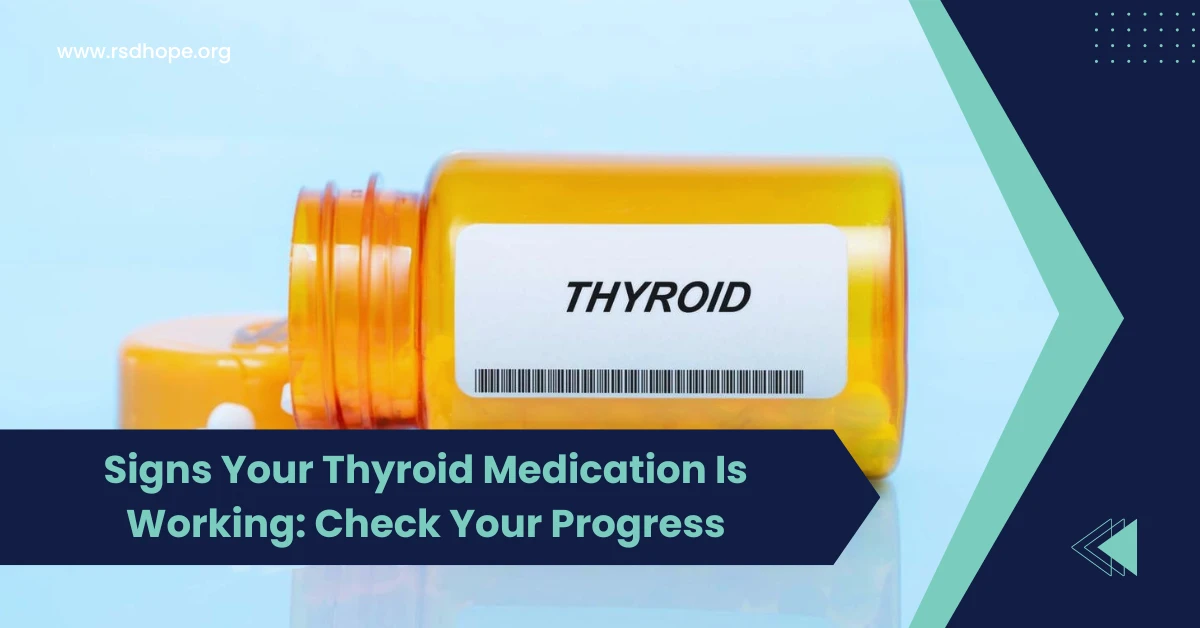Thyroid medication is crucial for managing thyroid disorders and maintaining optimal health. Finding the right dosage is key to effectively regulating thyroid hormone levels. This blog post will explore the signs that indicate your thyroid medication is working properly.
Key Takeaways
- Common thyroid medications include levothyroxine, liothyronine, and natural desiccated thyroid.
- Symptoms like fatigue, weight changes, and mood issues can signal incorrect medication dosages.
- Regularly monitoring thyroid levels and communicating with your doctor are essential for successful treatment.
Common Thyroid Medications
The most frequently prescribed thyroid medications are levothyroxine (Synthroid), liothyronine (Cytomel), and natural desiccated thyroid (NDT). These medications work by supplementing or replacing the hormones produced by the thyroid gland. Levothyroxine is a synthetic form of the thyroid hormone thyroxine (T4), while liothyronine is a synthetic form of triiodothyronine (T3). NDT, derived from porcine thyroid glands, contains both T4 and T3.
Also Read: Signs Of Vitamin Deficiency In Nails
Signs Your Thyroid Medication Is Too Low
If your thyroid medication dosage is too low, you may experience symptoms of hypothyroidism. Common signs include:
- Fatigue and low energy levels
- Unexplained weight gain
- Depression or low mood
- Constipation and digestive issues
- Feeling cold or sensitivity to low temperatures
Regularly monitoring your thyroid hormone levels through blood tests is crucial. If you notice these symptoms, consult your healthcare provider to adjust your medication dosage accordingly.
Signs Your Thyroid Medication Is Too High
Conversely, an excessively high thyroid medication dosage can lead to symptoms of hyperthyroidism. Watch out for:
- Anxiety and irritability
- Rapid or irregular heartbeat
- Unintended weight loss
- Difficulty sleeping or insomnia
- Tremors or shaky hands
If you experience these symptoms, schedule a follow-up with your doctor. They may need to reduce your medication dosage to prevent complications.
How Long Does It Take for Thyroid Medicine to Work?
Thyroid medication typically takes several weeks or even months to fully take effect. As your body adjusts to the new hormone levels, you may gradually notice improvements in your symptoms. However, individual response times can vary. Some people may feel better within a few weeks, while others may need more time. Be patient and consistent with your medication regimen during this adjustment period.
Signs Your Thyroid Medication Is Working
When your thyroid medication is working effectively, you should experience positive changes in your overall well-being. Look for these encouraging signs:
- Improved energy levels and reduced fatigue
- Weight stabilization or gradual weight loss
- Enhanced mood and reduced symptoms of depression
- Better regulation of body temperature
- Reduced or resolved symptoms related to your thyroid disorder
Keep track of your symptoms and share any improvements or concerns with your healthcare provider. They can help fine-tune your treatment plan based on your progress.
Conclusion
Finding the right thyroid medication dosage is a process that requires patience, regular monitoring, and open communication with your healthcare team. By understanding the signs of both under- and over-medication, you can better advocate for your thyroid health. Remember, everyone’s journey is unique, so don’t hesitate to discuss any questions or concerns with your doctor. With the right treatment plan and consistent follow-ups, you can effectively manage your thyroid disorder and enjoy improved quality of life.
Read More: Why Do Bananas Make My Stomach Hurt? Investigating The Link
FAQs
A: No, you should never stop taking your thyroid medication without consulting your doctor first. Abruptly stopping can lead to serious health consequences.
A: The frequency of thyroid level monitoring depends on your individual condition and treatment plan. Typically, doctors recommend testing every 6-12 months once your levels are stable.
A: While the active ingredients may be the same, different brands can have varying inactive ingredients that may affect absorption. Always consult your doctor before switching brands.
A: If you miss a dose, take it as soon as you remember. However, if it’s close to your next scheduled dose, skip the missed dose and continue with your regular schedule. Never double your dose to make up for a missed one.
References:
- American Thyroid Association. (2021). Thyroid Hormone Treatment. Retrieved from https://www.thyroid.org/thyroid-hormone-treatment/

